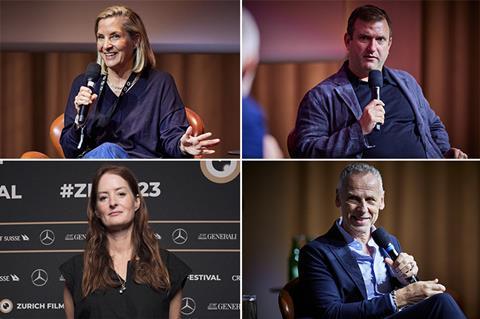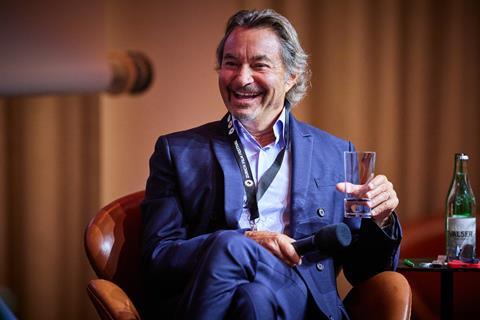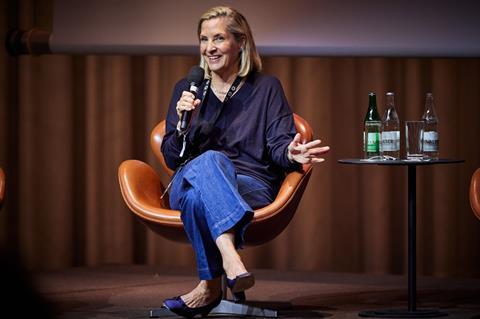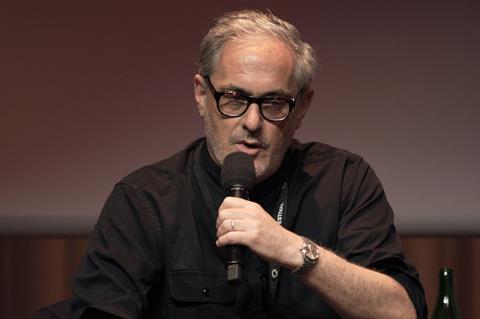
The US sreamers are reframing their relationship with the independent film industry and becoming more flexible in their deal-making, according to leading international film executives at the Zurich Film Festival’s Industry Summit on Saturday (September 30).
At the Summit, many execs also expressed cautious optimism about the future of the theatrical industry following the twin hits of the pandemic and the strikes. There were also strong calls for more original, distinctive content following the success of Barbie and Oppenheimer, as well as discussions about the importance of film festivals for launching movies.
Held at the Dolder Grand hotel in Zurich, the Summit gathered together leading execs from the US and European industries for a day-long series of panels and interviews. Here Screen rounds up some of the major talking points from the day.
Flexible streamers
Multiple execs stressed at the Zurich Summit that streamers are no longer striking ‘monolithic’ all rights buyout deals that they became known for in the early stages of the SVOD boom.

Patrick Wachsberger, founder and CEO of Picture Perfect Federation, spoke of streamers’ greater ‘flexibility’ than in the past. “You can see streamers buying certain windows depending on the territories.” He cited Netflix in France buying first or second pay windows, Apple releasing films theatrically such as Napoleon in the US with a 45-day window (Apple has not confirmed the length of its exclusive theatrical release in partnership with Sony Pictures) and Amazon buying specific movies for specific territories.
Sasha Buhler, Netflix director of film for the DACH region, said the streamer tries to be open to new deal terms, and cited its recent deal with Germany’s Constantin Film to take pay-one windows which “helps them to finance their theatrical films.” As a result, Netflix will play Constantin’s films on its platform 10-12 months after their theatrical release.
Roeg Sutherland, CAA’s co-head of film finance and sales group, also suggested the streamers are being more ‘malleable’ and pointed to Netflix’s $20m acquisition of Richard Linklater’s Hit Man at Toronto, taking rights for the US and a few smaller territories. (Neon founder and CEO Tom Quinn later revealed at the Summit that his company was the second highest bidder for Hit Man with an offer of $10m for the movie).
Many speakers said the new kind of “co-existence” between the streamers and the independent market was a positive step for the industry.
Thorsten Schumacher, founder and CEO of UK-based sales agent and financier Rocket Science, said: “We’re already mixing and matching where we sell into streamers and independents. It’s constantly evolving and morphing.”
“There is definitely a change in terms of the streamer approach,” added John Friedberg, president of sales agency Black Bear International. He cited Netflix’s $11m acquisition of North American rights to Todd Haynes’ May December. “You can have a US streamer and independent theatrical sales internationally – that is a possible outcome.”
He also said Black Bear had struck hybrid deals for Michael Mann’s Ferrari, selling certain territories to streamers and others to independents (such as Neon in the US). “We’re finding a sort of combination of different territorial distributors that all together can aggregate into the financing.”
Friedberg was optimistic about the streamers more flexible approach to theatrical windowing: “Streamers are making inroads in terms of theatrical. From Killers Of The Flower Moon to Napoleon, to Courtenay Valenti’s new division at Amazon really supporting theatrical. It’s not only day and date, there are significant windows – 45 days. They are increasingly participating in the theatrical market place.
Despite producing more original content themselves, the streamers “are always going to be interested in acquisitions,” suggested John Lesher, the Oscar- winning producer of Birdman, partly because it is so hard to create standout content. “They are developing stuff, which is actually good. But do those movies end up being up being good movies? That’s another question. And rarely do they.”
Streamers not scaling back

Meanwhile, Netflix’s Berlin-based Buhler countered widespread industry belief that the bubble has burst on the streaming market. She said Netflix is now producing in 50 countries and said overall spend at the streamer is not changing. She underlined Netflix has only been producing films in the EMEA region since 2019, and was still learning what its members want and “trying to stay agile.”
“We are not slowing down by any means in any market – we are just being a bit more deliberate about what works for our members,” said Buhler.
“Some territories are more saturated than others… EMEA is a growth market for us for sure. We have not slowed down at all in our investment,” she added.
Asked if she thought that streamers were scaling back, WME Independent agent Katie Irwin said she didn’t think so but said they were being more agile and constantly changing tack. Irwin noted their spend may be staying the same at a time when the cost of creating content is rising.
Optimism returns
Many of the speakers at the Zurich Summit struck an optimistic note about the future of the industry. After the twin hits of the Covid pandemic and the strikes there was a sense that – if and when the actor’s strike is resolved – audiences will return to cinemas in increasing numbers.
![]()
“I’m bullish because it has always been hard,” said Neon’s Tom Quinn, revealing all of Neon’s “really tough art films and foreign language documentaries have all hit what I believe are pre-pandemic targets” in the US market.
Neon, which has acquired the four most recent Cannes Palme d’Or winners (Parasite, Titane, Triangle Of Sadness and this year’s Anatomy Of A Fall) was particularly bullish about the prospects for Justine Triet’s movie in the US. “I believe Anatomy Of A Fall is going to do exceptionally well and that it is going to crossover well beyond a basic specialised audience,” said Quinn. ”I think it is going to be a multi-tier Academy Award nominee, plus the winner.”
Iconoclast head of film and TV Robert Walack said younger audiences want to “really participate in the theatrical experience” in the wake of the pandemic. He reflected on going to a screening of the 20th anniversary theatrical rerelease of Park Chan-wook’s Oldboy, where many in the audience were ‘barely above 25 years old.’ “Then you look at what Metrograph are doing in New York and their expansion or at what is happening with Vidiots in Eagle Rock where you have these younger speciality audiences turning up in droves for sold out screenings.”
Kiska Higgs, president of production and acquisition at Focus Features, said the theatrical market faced huge competition for attention from streaming and social media, but she remained upbeat. “It is not a zero-sum game…the theatrical experience is unparalleled as an audience experience because it is transformative and it is communal – and none of the other media are that,” said Higgs.

John Lesher said the industry was in the “final stages of recovery” from the shock of the pandemic and changing view habits. Barbie and Oppenheimer have been “great news for exhibition,” as have a spate of successful horror movies. “I feel it is just really part of getting older folks back into the cinema again, which is well underway,” said Lesher.
“Coming out of Covid and hopefully coming out of the SAG strike soon, windows have changed, there are more ways to make movies than there have been for a long time,” he said.
Friedberg also said he was “pretty excited” about the business right now. He cited Guy Ritchie’s new as yet unnamed film that Black Bear recently launched into the marketplace starring Jake Gyllenhaal and Henry Cavill that has been shooting in Spain. “We sold that film incredibly well, independently, territory by territory. We made the film during the strike with a waiver. We sold it to Lionsgate for the US – and it is completely independently financed.”
Friedberg said indie buyers are hungry for content. “We’ve gone through a very challenging period over the past five years…and I just think there’s a resilience in the independent film business when you see the ability to make the films of this level, but also the lower budget genre movies that are also being made.”
Rocket Science’s Schumacher said the one thing that could benefit the US industry is more theatrical distributors.
Leonine Studios CEO Fred Kogel, who is being honoured at Zurich with its ’Game Changer’ award, said the German market was going through a difficult period but that he was optimistic in the long term.
“Sky quit local fiction productions. There’s high inflation…Germany is in regression, the market is weak, the ad market is down, but it will come back. Everything goes in circles,” said Kogel.
Originality sells
Many speakers reflected on the success of Oppenheimer and Barbie, and noted again that audiences were after films that stood out in a sea of content.
“Originality sells,” said Roeg Sutherland. “If you have a point of view, it sells. It needs to feel different, it needs to feel fresh and new. The times of putting on the same trailer to get people to the theatre, that time has passed.”
“I think there’s space for all,” countered WME’s Irwin. “Sometimes you want a new voice, something that’s going to stretch your brain but sometimes after a long day you want to scratch that itch with a brawny action movie.”
Festival planning
Execs also discussed the importance of film festivals in launching films and supporting up and coming directors.
MK2’s managing director Fionnuala Jamison, whose company is selling Justine Triet’s Palme d’Or winner Anatomy Of A Fall, said prizes at festivals are a major draw for audiences in countries like China and the US.
She said Parasite’s huge success in 2019 and early 2020 had “really elevated the Palme d’Or and what that means to audiences.”
Jamison noted Neon, the US distributor of Anatomy Of A Fall, had recently held a test screening for the film for 250 US cinemagoers. “The number one driving force for them to go to the test screening was the Palme d’Or. That’s really changed in the last few years.”
TrustNordisk’s managing director Susan Wendt said it was important to agree the right festival platform to launch a film. She cited the planning for The Promised Land, starring Mads Mikkelsen.
“The thinking was very strategic from the beginning. We were hoping for it to become the Danish Oscar entry, which it now is and for that the timing was perfect. We tried to get the trio – Venice, Telluride and Toronto - which is not an easy task to aim for, but we succeeded in that. Then all the other festivals came afterwards – San Sebastian, Zurich, Busan and it keeps on going. It’s perfect for that film because it’s very tough competition this year on the Oscar side.”

























No comments yet